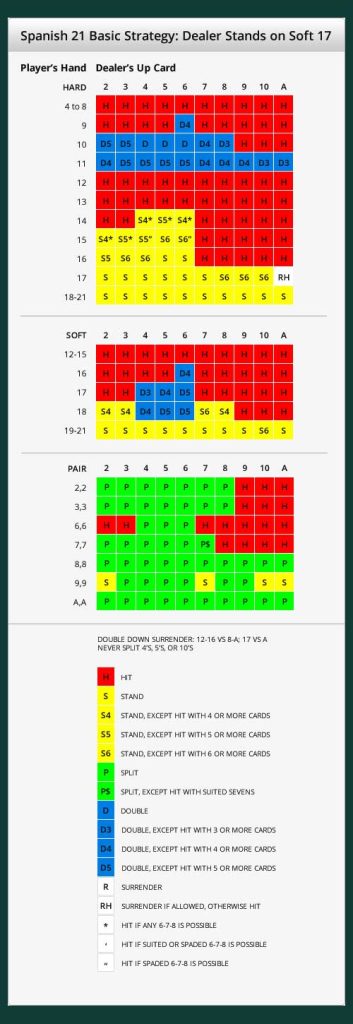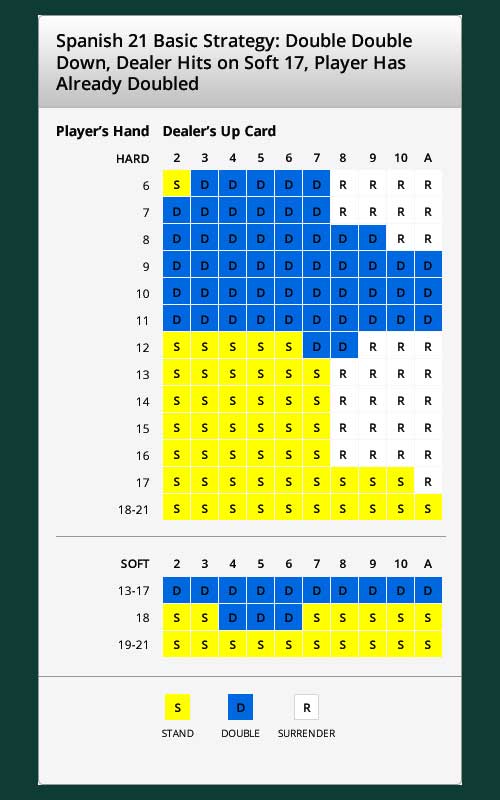Spanish 21 is an exciting blackjack variant that offers players a unique experience and, in certain situations, may even be the better choice over traditional blackjack. This variation becomes particularly favorable in casinos where the dealer stands on a soft 17 or allows redoubling, as these rules reduce the house edge further. If you’re seeking a refreshing alternative to classic blackjack while still enjoying a low-risk game, Spanish 21 could be the perfect fit, offering a blend of strategy and excitement with its own set of rules and opportunities. Additionally, learning the Spanish 21 basic strategy can help you make informed decisions, improving your chances of winning by guiding you on when to hit, stand, or double down based on the cards dealt.
Spanish 21 Rules
Spanish 21 is one of the most fast-paced and exciting blackjack variations found in casinos worldwide. While it looks similar to standard blackjack, the Spanish 21 rules introduce unique twists that change both strategy and odds. The game is known for its flexible player-friendly rules, bonus payouts, and fast action — all of which make it a popular choice for players looking for something more dynamic than traditional blackjack.
Spanish 21 combines the speed of traditional blackjack with exciting bonus payouts and flexible player rules. The removal of 10s makes the game mathematically unique, but advantages like automatic 21 wins, late surrender, re-doubling, and special bonuses help balance the odds. Understanding these Spanish 21 rules will give you a strong foundation whether you’re playing in a land-based casino or enjoying Spanish 21 online.
Below is a full breakdown of how the game works, what makes it different, and the rules you must understand before playing.
Key Player Advantages:
- Late Surrender: Players can surrender after seeing their cards and the dealer’s upcard.
- Double After Split: Players are allowed to double down even after splitting.
- Re-splitting Aces: Aces can be re-split if needed.
- Player 21 Always Wins: A player’s 21 always beats the dealer’s hand.
- Blackjack Rules: A player’s blackjack always beats the dealer’s blackjack.
- Doubling on Any Number of Cards: Players can double down regardless of how many cards they’ve been dealt.
- Post-Split Doubling and Hitting: In many cases, players can double down or hit after splitting aces.
- Double Down Rescue: After doubling, players can opt to surrender and recover an amount equal to the original bet.
Special Payouts:
- Five-Card 21: Pays 3 to 2.
- Six-Card 21: Pays 2 to 1.
- Seven-Card 21 or More: Pays 3 to 1.
- 6-7-8 and 7-7-7 Combinations:
- Mixed suits pay 3 to 2.
- Same suit pays 2 to 1.
- Suited 7-7-7 of spades pays 3 to 1.
- Bonuses are not paid after doubling.
- Suited 7-7-7 Special Bonus: When the dealer has a seven face-up, players can win up to $1,000 (for bets of $5-$24) or $5,000 (for bets of $25 or more), plus a $50 “envy bonus” for other players. This bonus does not apply after splitting or doubling.
Variable Rules:
- Dealer’s Soft 17: The dealer may either hit or stand on a soft 17.
- Deck Variations: Spanish 21 is typically played with 6 or 8 Spanish decks.
- Redoubling: Some casinos allow players to redouble up to three times.
- Splitting Aces: Rules on drawing to split aces or whether a face card + ace after splitting counts as blackjack may vary, depending on the casino.
- Bonus Payouts After Split: Though bonuses, excluding the Super Bonus, are generally payable after splitting, some casinos do not honor these payouts, which has a negligible impact on the overall odds.
Spanish 21 Basic Strategy Overview
The strategy in Spanish 21 varies depending on the number of cards in your hand and whether or not you’ve doubled. Here’s a simplified version of the strategy.
Without Doubling:
For a hand of 5-7, hit; for 8, double if dealer has 3-4, otherwise hit.
For hands of 9-11, doubling is often recommended, depending on the dealer’s card.
For a hand of A,2 to A,9, the strategy varies from hitting to standing, based on the dealer’s card and the composition of your hand.
After Doubling:
Continue to hit or stand based on the dealer’s face-up card and your current hand.
In some situations, surrender is a viable option if the hand strength is weak against the dealer’s card.
Hard Totals Spanish 21 Cheat Sheet
| Player Total | Dealer 2–6 | Dealer 7 | Dealer 8–9 | Dealer 10 | Dealer Ace |
|---|---|---|---|---|---|
| 5–8 | Hit | Hit | Hit | Hit | Hit |
| 9 | Double vs 6; otherwise Hit | Hit | Hit | Hit | Hit |
| 10 | Double vs 2–9 | Double | Double | Hit | Hit |
| 11 | Double (always) | Double | Double | Double | Double |
| 12 | Stand vs 4–6 | Hit | Hit | Hit | Hit |
| 13–14 | Stand vs 2–6 | Hit | Hit | Hit | Hit |
| 15–16 | Stand vs 2–6 | Hit | Hit | Hit | Hit |
| 17+ | Stand | Stand | Stand | Stand | Stand |
Soft Totals Spanish 21 Cheat Sheet
| Soft Total | Dealer 2–6 | Dealer 7 | Dealer 8–9 | Dealer 10 | Dealer Ace |
|---|---|---|---|---|---|
| A2–A4 | Double vs 4–6; otherwise Hit | Hit | Hit | Hit | Hit |
| A5–A6 | Double vs 4–6; otherwise Hit | Hit | Hit | Hit | Hit |
| A7 | Stand vs 2,7,8; Double vs 3–6; Hit vs 9–A | ||||
| A8–A9 | Stand (always) | Stand | Stand | Stand | Stand |
Pairs / Splitting Spanish 21 Cheat Sheet
| Pair | Action |
|---|---|
| A-A | Always Split |
| 2-2 | Split vs 2–7; otherwise Hit |
| 3-3 | Split vs 2–7; otherwise Hit |
| 4-4 | Hit (splitting rarely allowed except vs 5–6 in some rules) |
| 5-5 | Never Split — Double vs 2–9, Hit vs 10–A |
| 6-6 | Split vs 2–6; otherwise Hit |
| 7-7 | Split vs 2–7; otherwise Hit |
| 8-8 | Always Split |
| 9-9 | Split vs 2–9 except 7; Stand vs 7 |
| 10-value cards | No 10s exist in Spanish 21 decks |
Spanish 21 Strategy Chart




Spanish 21 Strategy When Player Has Not Doubled
| Your Hand | Dealer’s Face-up Card | |||||||||
| 2 | 3 | 4 | 5 | 6 | 7 | 8 | 9 | 10 | A | |
| 5-7 | H | H | H | H | D | H | H | H | H | H |
| 8 | H | H | H | D | D | H | H | H | H | H |
| 9 | H | D3 | D | D | D | H | H | H | H | H |
| 10 | D4 | D4 | D | D | D | D4 | D4 | H | H | H |
| 11 | D3 | D4 | D4 | D4 | D4 | D4 | D4 | D3 | D2 | D2 |
| 12 | H | H | H | H | H | H | H | H | H | H |
| 13 | H | H | H | H | S3* | H | H | H | H | H |
| 14 | H | H | S3* | S4* | S5* | H | H | H | H | H |
| 15 | S3* | S4* | S5 | S5 | S | H | H | H | H | H |
| 16 | S5 | S5 | S5 | S | S | H | H | H | H | R |
| 17 | S | S | S | S | S | S | S5 | S5 | S5 | R |
| 18+ | S | S | S | S | S | S | S | S | S | S |
| A,2 | H | D2 | D | D | D | H | H | H | H | H |
| A,3 | H | D2 | D3 | D | D | H | H | H | H | H |
| A,4 | H | H | D3 | D3 | D4 | H | H | H | H | H |
| A,5 | H | H | D2 | D3 | D4 | H | H | H | H | H |
| A,6 | H | H | D2 | D3 | D4 | H | H | H | H | H |
| A,7 | S3 | S3 | D3 | D4 | D5 | S5 | S3 | H | H | H |
| A,8 | S | S | S | S | S | S | S | S | S5 | S5 |
| A,9 | S | S | S | S | S | S | S | S | S | S |
| 2,2 | P | P | P | P | P | P | P | H | H | H |
| 3,3 | P | P | P | P | P | P | P | H | H | H |
| 4,4 | H | H | H | D | D | H | H | H | H | H |
| 5,5 | D | D | D | D | D | D | D | H | H | H |
| 6,6 | H | H | P | P | P | H | H | H | H | H |
| 7,7 | P | P | P | P | P | P* | H | H | H | H |
| 8,8 | P | P | P | P | P | P | P | P | P | R |
| 9,9 | S | P | P | P | P | S | P | P | S | S |
| 10,10 | S | S | S | S | S | S | S | S | S | S |
| A,A | P | P | P | P | P | P | P | P | P | P |
| H | Hit | |||||||||
| S | Stand | |||||||||
| S# | Stand on # or fewer cards, otherwise Hit | |||||||||
| S* | Stand unless 6/7/8 bonus is possible | |||||||||
| D | Double | |||||||||
| D# | Double on # or fewer cards, otherwise Hit | |||||||||
| P | Split (Pair) | |||||||||
| P* | Split unless suited 7s (possible bonus) | |||||||||
| R | Surrender if possible, otherwise Hit | |||||||||
Spanish 21 Strategy When Player Has Not Doubled
| Your Hand | Dealer’s Face-up Card | |||||||||
| 2 | 3 | 4 | 5 | 6 | 7 | 8 | 9 | 10 | A | |
| 7 | D | D | D | D | D | D | R | R | R | R |
| 8 | D | D | D | D | D | D | D | D | R | R |
| 9 | D | D | D | D | D | D | D | D | D | D |
| 10 | D | D | D | D | D | D | D | D | D | D |
| 11 | D | D | D | D | D | D | D | D | D | D |
| 12 | S | S | S | S | S | D | D | R | R | R |
| 13 | S | S | S | S | S | S | R | R | R | R |
| 14 | S | S | S | S | S | S | R | R | R | R |
| 15 | S | S | S | S | S | S | R | R | R | R |
| 16 | S | S | S | S | S | S | R | R | R | R |
| 17 | S | S | S | S | S | S | S | S | S | R |
| 18+ | S | S | S | S | S | S | S | S | S | S |
| A,2-A,6 | D | D | D | D | D | D | D | D | D | D |
| A,7 | S | S | D | D | D | S | S | S | S | S |
| A,8+ | S | S | S | S | S | S | S | S | S | S |
| S | Stand | |||||||||
| D | Double | |||||||||
| R | Surrender | |||||||||
It’s highly recommended that you refrain from aiming for the bonus payouts, and you should avoid placing any extra side bets that require an additional cost for eligibility. It’s also important to note that while surrendering your hand is an option in the game, it’s far from always a profitable move. The reduced presence of 10-value cards in the game significantly decreases the likelihood of busting on many hands, making it often more advantageous to draw another card. Beginners to the game frequently overuse the surrender option, particularly those accustomed to traditional blackjack.
Close Call Strategies
There are several “close call” situations in Spanish 21 where strategy recommendations may differ, such as 5/6 vs dealer 6 (double vs hit), 13 vs dealer 6 (hit vs stand), and A2/3 vs dealer 3 (double vs hit). These require careful consideration and may depend on the specific rules of the table you’re playing at.
If you like gambling and betting, you may also find our odds betting calculator useful.
FAQ
The main differences include the removal of 10s from the deck, player blackjack and 21 always winning, and various bonus payouts.
Yes, players can double down on any number of cards and even after splitting.
They include payouts for 5-card 21s, unsuited/suited 6-7-8 or 7-7-7 combinations, and more.
No, strategies can vary, especially in close call situations, and often depend on the specific rules at the table.


